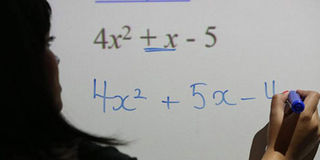New programme seeks to improve maths skills

Under the programme, that is now being implemented by an international organisation Whizz Education, learners are being taught mathematics through use of technology popularly known as mathwhizz. FILE PHOTO
A programme that seeks to improve learning outcomes in mathematics in primary schools in four counties in marginalised areas has been stepped amid poor performance in the subject in national examinations.
The programme that is being implemented by Whizz Education with support from United Kingdom’s Department for International Development (DFID) in collaboration with Kenya government seeks to sharpen skills of learners in primary schools by embracing technology.
The programme is banking of digital learning programme which is so far in 19,000 schools.
Already 241 schools in Kilifi, Kajiado, Uasin Gishu and Makueni counties have been provided each with 35 computers for the implementation of the progrmame now in its fourth year.
A report by the Ministry of Education released in September revealed shocking details on capacities of pupils in understanding core subjects such as mathematics, English and Kiswahili.
Under the programme, that is now being implemented by an international organisation Whizz Education, learners are being taught mathematics through use of technology popularly known as mathwhizz.
Learners in primary schools are able to log into the system and a virtue teacher comes with a topic and takes the individual learner through a formula of solving a mathematic problem.
It gives the learner questions that he or she can answer and if the learner does not understand completely, he or she is dropped to the next level.
While logging in the learner has to indicate age so that the programme can provide questions that match the age or the Grade the learner is in.
Supervisor who are attached to the central system are able to monitor the progress of each learner and advise where they need to improve. Teachers are also able to log into the system and monitor the progress of each learner.
Whizz Education country director Catherine Wangechi says the programme is doing well since they are working together in terms of the implementation of digital learning programme.
Ms Wangechi admits that girls still have a challenge but the organization is determined to demystify the perception.
“All kids can do well in mathematics. Mathematics is a very important subject and that is why we want all kids to have knowledge and understanding of the subject. With this empowerment we will bridge the gap,” says Ms Wangechi.
She adds the organisation is working with the ministry of Education to realise its objective with focus on marginalised areas.
She says the project which started in 2015, has seen the schools which are benefiting provided with 35 computers and satellite dish a well as internet.
“Our major focus is improving learning outcomes so that we can make a difference,” says Ms Wangechi.
Mr David Muniu, partnership advisor, Africa says the project has already been rolled out in Kenya, Democratic Republic of Congo and Ghana with focus now set to shift to Rwanda.
“We want more partnership with the government in order to reach all learners across the country so that they can improve mathematics,” says Mr Muniu.
He adds that the focus is on mathematics because it is an important subject that is critical in realisation of vision 2030 which is banking on STEM.
“If learners do not get it well in mathematics, it affects performance of other subjects such as physics, biology and chemistry among others,” says Mr Muniu.
He adds that in schools where the programme is being implemented performance of mathematics has improved and learners are not missing school.
The learners takes about 30 minutes and the materials are approved by Kenya Institute of Curriculum of Development(KICD).
ICT Authority Chief Executive Dr Katherine Getao says digital literacy programme has undergone huge growth in the country and influencing the way learners gain knowledge and skills through digital devices.
Dr Getao points out that Kenya is growing fast in the Fintech sector and there is a thought leadership and policy around this areas of innovation by the Kenya Revenue Authority to emulate.
Dr Getao said:” As the Education sector, we cannot be left behind. In fact, there is no other country in the world with Tablets and digital learning devices in the hands of 6 years to 8 years old.”
She goes on: “I think this is a forum to inspire research. For example a research to see into the impact of the learning devices among children in Turkana. The learners who first benefited from the DLP devices are set to join grade 4.”





